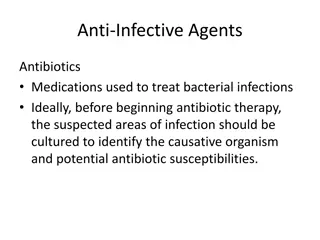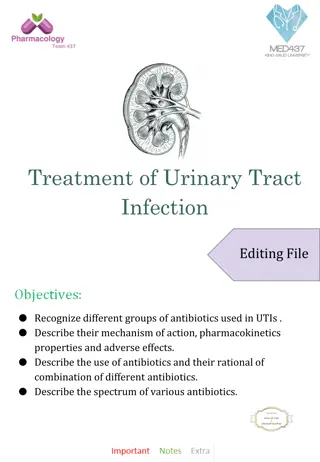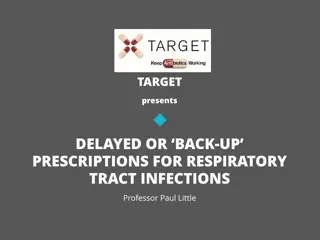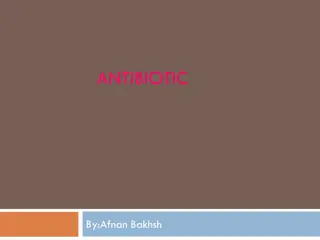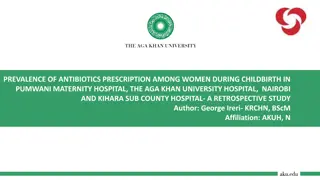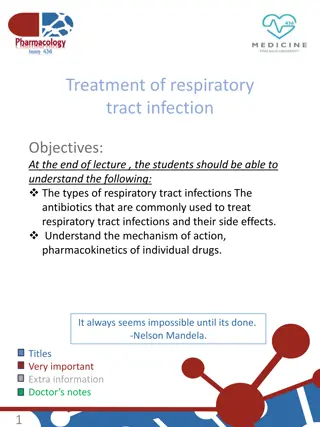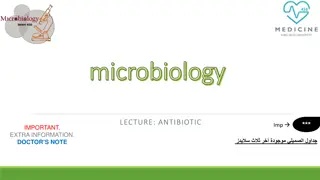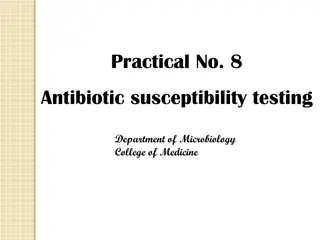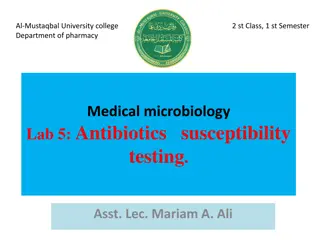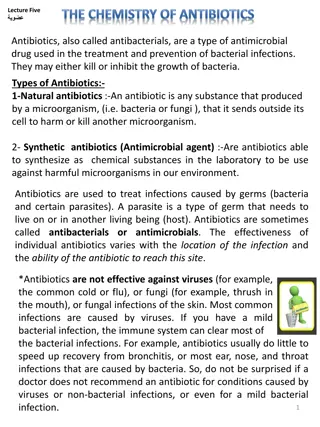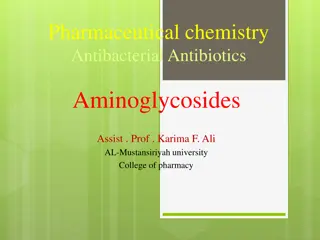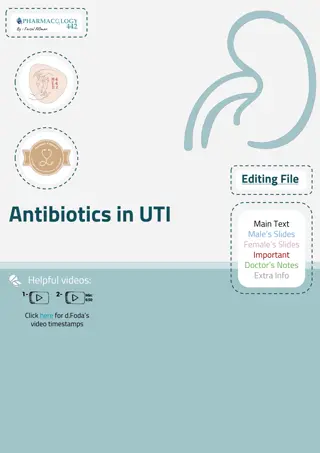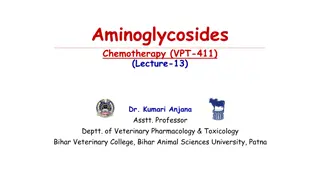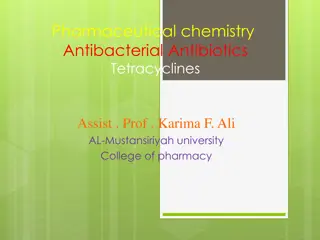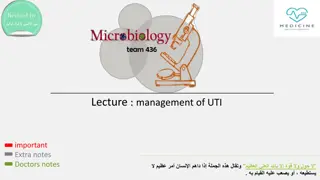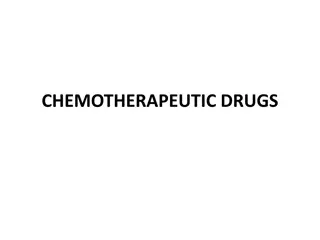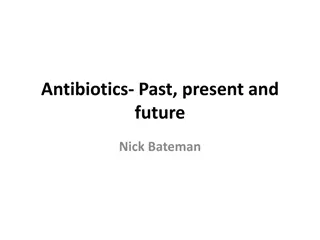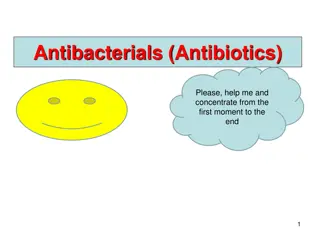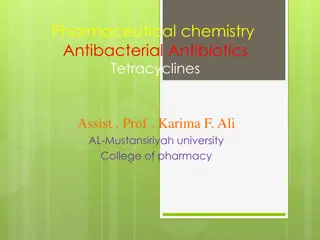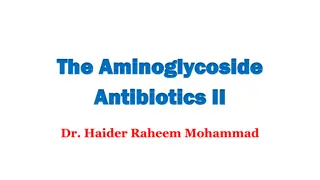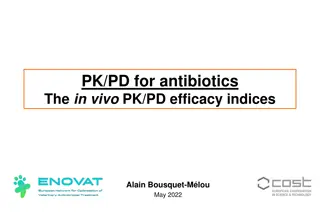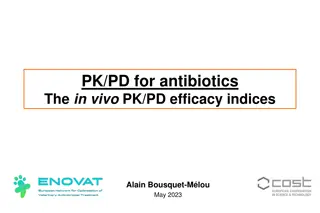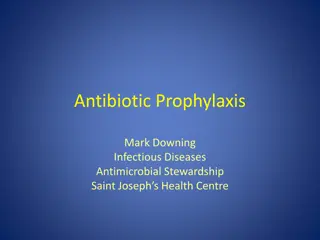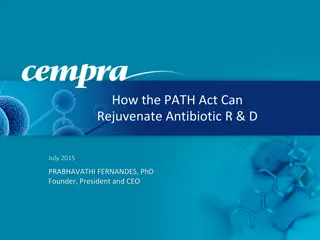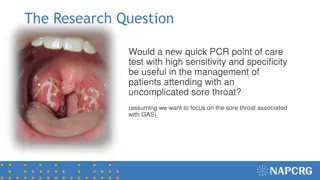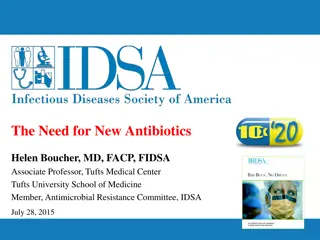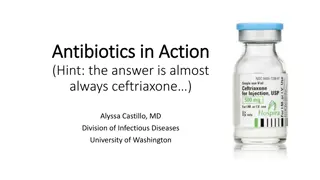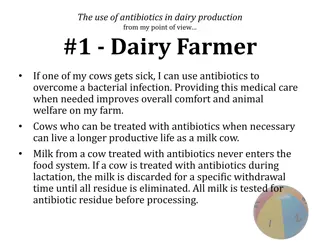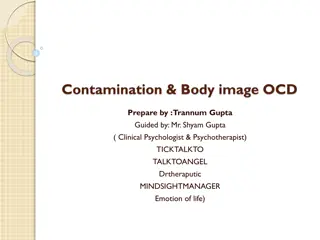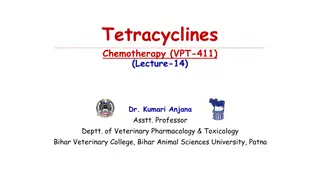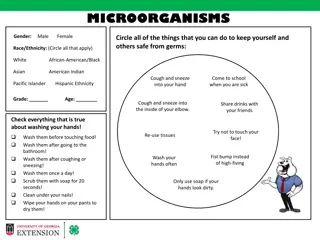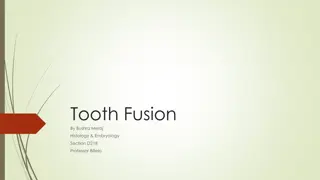Understanding Antibiotics and Their Effects on Germs
Explore the world of antibiotics and their impact on bacteria, fungi, viruses, and mild bacterial infections. Delve into the chemistry of antibiotics, their mechanisms, and how they combat various germs. Learn about the treatments involving antibodies and specific conditions like Helicobacter pylori. Discover the fascinating realm of parasites, viruses, bacteria, and fungi, gaining insights into their characteristics and effects. Antibiotics play a crucial role in fighting bacterial infections and preserving human health.
Download Presentation

Please find below an Image/Link to download the presentation.
The content on the website is provided AS IS for your information and personal use only. It may not be sold, licensed, or shared on other websites without obtaining consent from the author. Download presentation by click this link. If you encounter any issues during the download, it is possible that the publisher has removed the file from their server.
E N D
Presentation Transcript
List of contents: Antibiotics. The Chemistry of Antibiotics The effect of Antibiotics on Germs: Types of Antibiotics: How Antibiotics they affect bacteria? Antibacterial Antibiotics Does Effect: The effect of Antibiotics on fungal, viral & mild bacterial infection. Treatments. Application of Antibodies Treatments:Helicobacter pylori (H. pylori).
The Aim of Lecture: - To Know Antibiotics, the Chemistry of Antibiotics & their effect on Germs: Types of Antibiotics: - How Antibiotics they affect bacteria? The effect of Antibiotics on fungal, viral & mild bacterial infection. Treatments. To Know the efficient activity by Application of Antibodies as a treatments To Know Helicobacter pylori (H. pylori) & its treatment. .
The Chemistry of Antibiotics A drug A drug is a chemical which is given to people in order to treat or prevent an illness or disease. Drugs are substances that some people take because of their pleasant effects, but which are usually illegal. Antibiotics: Figure-1: Drugs. Antibiotics: also known as antibacterials, are medications that are used to suppress or inhibit the growth of bacteria, or destroy other microorganisms, at very low concentrations. Antibiotics are used in the treatment, and prevention of bacterial infections. You know that your body is made of cells - but just how many? Turns out that question isn t all that easy to answer Human body have trillions of cells about 37.2 Trillion cells, our skin consist of 35 Billion cells, besides our bodies are very astonishing to know that each individual of skin cells have a potential to be use as stem cells beside antibiotics for curing infections, Figure 1. Figure-1: Skin cells. 6
A parasite: is a type of germ that needs to live on or in another living being (host). Viruses:are the only group of microorganisms that cannot replicate outside of a host cell. Because viruses do not eat food - instead they seize materials and energy from host cells.1 Figure: Viruses.2 Bacteria: Bacteria are ten to 100 times larger than viruses. Some bacteria live and multiply in the environment while others are adapted to life within human or animal hosts. Some bacteria can double in number every fifteen minutes, while others take weeks or months to multiply. Figure : Bacteria. https://www.youtube.com/watch?v=wEvW1ZF7if4 Fungi: Fungi are eukaryotes, meaning that like parasites, their cells have a true nucleus and complex internal structures. They can cause disease in humans in the form of yeasts. Fungal diseases are particularly dangerous to immunocompromised people, such as those suffering from AIDS. Figure : Fungal Pigments. 7
The effect of Antibiotics On Germs: Antibiotics are sometimes called antibacterial, or antimicrobials. The effectiveness of individual antibiotics varies with 1- The location of the infection. 2- The ability of the antibiotic to reach this site. 3- Also depend on the concentration of antibiotics. 4- The type of microorganism. 5- The way of interfering of antibiotics with the bacterial nucleic acids & protein synthesis. Antibiotics are used to treat infections caused by germs. Bacteria and viruses can live outside of the human body sometimes for many hours or days. Parasites require a living host in order to survive. Bacteria and parasites can usually be destroyed with antibiotics. On the other hand, antibiotics cannot kill viruses. Children sick from a virus can be given medicines to make them feel better. But antibiotics don't fight viral infections.3 Types of Antibiotics: There are two types of antibiotics: 1- Synthetic Antibiotics (Antimicrobial agent). 2- Antibacterial Antibiotics. 8
Types of Antibiotics: 1- Synthetic Antibiotics (Antimicrobial agent): Are a type of antibiotics synthesize as chemical substances in the laboratory to be use later against harmful microorganisms in our environment. Tetracyclines, Polyene antibiotics, Nitro furan derivatives, and so on based on their chemical structure. 2-Antibacterial Antibiotics: Antimicrobial drugs are naturally occurring antibiotics produced by a microorganism, i.e. bacteria or fungi, then send outside its cell to be harmful or kill another microorganism. Their activity consist of a heterocyclic ring, its a large heterocyclic lactone ring attached to one or more sugar. The lactone rings are usually 14, 15, or 16-membered, figure-2 & 3. For example the antimicrobials of Penicillins are either bacteriostatic or bactericidal having a lactone rings usually 14, 15, or 16-membered in its structures. Figure- : Beta-Lactam ring present in Penicillin structure. 9
How Antibiotics they affect bacteria? Antibiotics stop bacteria multiplying by preventing them from being able to produce proteins that are essential for their growth. The bacteria eventually die or are killed by your immune system, Figure . Figure 5: Immune system help for killing Bacteria. Finishing the course: It is essential that you finish taking your course of antibiotics even if you feel better. If you stop taking an antibiotic part way through a course, the bacteria can become resistant to the antibiotic. The infection could then be harder to treat in future. Missed dose: If you forget to take dose of macrolide antibiotic, take that dose as soon as you remember, and then continue to take your course of antibiotics as normal, regarding that as a first dose. However, if it is almost time for the next dose, skip the missed dose and continue your regular dosing . Do not take a double dose to make up for a missed one. If you have to take two doses closer together than normal, there is an increased risk of side effects. Accidentally take one extra dose: Accidentally taking one extra dose of your macrolide antibiotic is unlikely to cause you any serious harm. However, it will increase your chances of experiencing gastrointestinal side effects such as pain in your stomach, diarrhea, nausea and vomiting. Accidentally take more than one extra dose: If you accidentally take more than one extra dose of your antibiotic, contact your doctor to decrease their effect immediately.
Antibacterial Antibiotics Does Effect: Macrolides antibiotics are a class of antibiotic that includes erythromycin, roxithromycin, azithromycin and clarithromycin. They are useful in treating respiratory, skin, soft tissue, sexually transmitted, H. pylori and atypical mycobacterial infections.3 Antibiotics produced by Streptomyces species, are used primarily against gram- positive bacteria. But the use of macrolide antibiotics involves a range of problems such as: - Increase the resistance of gram-positive and gram negative strains. - Slow bactericidal action, associated gastrointestinal disturbance. - Allergic reactions. Figure . - Hepatotoxic effects. Therefore, the number of novel 14-, 15-, and 16-membered antibiotics has been increasing over the years. Fig.4:Allergic reactions How does antibiotic resistance occur? Bacteria can adapt and find ways to survive the effects of an antibiotic. They become 'antibioticresistant' so that the antibiotic no longer works. The more we use an antibiotic, the more likely it is that bacteria will become resistant to it. Some bacteria that cause infections in hospitals, such as MRSA (Methicillin-resistant Staphylococcus aureus), are resistant to several antibiotics. When antibiotics are prescribed, the complete course should be taken to get rid of the bacteria completely. If the course is not completed, some bacteria may be left to develop resistance.
Can other antibiotics be used instead? It may not be as effective, and may have more side effects. And eventually, the bacteria will become resistant to them too. We cannot be sure we will always be able to find new antibiotics to replace the old ones. In recent years, fewer and fewer new antibiotics have been discovered.Figure . figure-5: Increased resistance of many bacterial strains. The effect of Antibiotics on fungal, viral & mild bacterial infection: Antibiotics are not effective against viruses (for example, the common cold, bronchitis or flu, or fungi (for example, thrush in the mouth), or fungal infections of the skin, figure . Most common infections are caused by viruses. If you have a mild bacterial infection, the immune system can clear most of the bacterial infections. For example, antibiotics usually do little to speed up recovery from bronchitis, or most ear, nose, and throat infections that are caused by bacteria. So, do not be surprised if a doctor does not recommend an antibiotic for conditions caused by viruses or non-bacterial infections, or even for a mild bacterial infection. Figure : Virus shape & Viral infections:- Bronchitis , Thrush in the mouth, and the skin fungal infections.
How should I treat my cold? The best way to treat most colds, coughs is to drink plenty of fluids and rest. Colds can last about two weeks and may end with a cough, and bringing up phlegm. There are many over-the-counter remedies to ease the symptoms - Paracetamol, for example. If you already have a chest complaint, see your doctor. But what about children? They're always getting coughs and colds. It is common for children to get coughs and colds, especially when they go to school and mix with other children. Ask your doctor - but you should not expect to be prescribed antibiotics. So when will I be prescribed antibiotics? The doctor will only prescribe antibiotics when you need them; for example, for a kidney infection or pneumonia. Antibiotics may be life-saving for infections such as meningitis. By only using them when necessary, they are more likely to work when we need them in future.
Treatments: Antibiotics are only effective in treating bacterial infections associated with the following conditions: Ear, nose and throat infections: Otitis media (infection of the middle ear). Sinusitis (infection of the sinuses). Tonsillitis (infection of the tonsils) Laryngitis (infection of the voice box). Chest infections: Pneumonia (infection of the lining of the lung). Bronchitis (infection of the airways of the lung). Whooping cough. Skin infections - such as eczema, Psoriasis, Acne that has become infected. When to avoid them or Using them with caution Pregnancy and breastfeeding If pregnant or are breastfeeding, the only type of macrolide antibiotic you can take is erythromycin. Erythromycin can be used at the usual doses throughout your pregnancy, or while are breastfeeding.
Application of Antibodies Treatments: Helicobacter pylori (H. pylori) Helicobacter pylori is the most common chronic bacterial infection in the world. More than 50% of the world's population are infected with H- Pylori. It is a type of bacteria can enter body,& live in digestive tract. After many years, they can cause sores, called ulcers, in the lining of stomach or the upper part of small intestine. For some people, an infection can lead to stomach cancer. Figure-7 Figure-7: Helicobacter pylori Bacteria and its effect on stomach. Peptic ulcer is a break in the inner lining of the stomach, the first part of the small intestine. Causes of peptic ulcers: Stress, Spicy food, hyperacidity. Signs are abdominal pain & swelling, black teeth, redness skin black stool. Treatment based on using Triple components set or use one capsule containing two Antibiotic and other compound (Three in one capsule), as shown bellow, inner capsule contain Tetracycline, while the outer capsule coated with Metronidazole Antibiotic. The modern treatment of peptic ulcers places emphasis on diet and rest. The patient is fed a bland diet, and small meals are given at frequent intervals. Milk, cream and protein hydro lysates are often prescribed between meals. Rest is essential. Figure. Figure : Three in one capsule.
Reference: 1- Viruses, Bacteria & Parasites | Lurie Children s 2https://www.google.com/url?sa=i&url=https%3A%2F%2Fwww.shutterstock.com%2Fimage-vector%2Fviral-shapes-different-viruses-diagram- showing601115009&psig=AOvVaw0cNd9f8NO8m9onnQeaIof1&ust=1602972040097000&source=images&cd=vfe&ved=0CA0QjhxqFwCMjRl6- OuuwCFQAAAAAdAAAAABAI 3- BPJ 44: The appropriate use of macrolides - BPAC nz bpac.org.nz bpj may macrolides 4- International Scholarly Research Notices / 2012 / Article / Fig 1 Review Article 5- Application of Different Analytical Techniques and Microbiological Assays for the Analysis of Macrolide Antibiotics from Pharmaceutical Dosage Forms and Biological Matrices. AssLantider Kassaye Bekele1and Getachew Genete Gebeyehu 6-Content provided by NHS Choices www.nhs.uk and adapted for Ireland by the Health A-Z. Health A-Z: sinusitis , Health A-Z: laryngitis, Health A-Z: bronchitis, www.medicines.ie H. pylori Bacteria Infection: Symptoms, Diagnosis, ... www.webmd.com digestive-disorders h-pylori-helicobacter-pylori
REFERENCE Application of Different Analytical Techniques and Microbiological Assays for the Analysis of Macrolide Antibiotics from Pharmaceutical Dosage Forms and Biological Matrices Lantider Kassaye Bekele1and Getachew Genete Gebeyehu Content provided by NHS Choices www.nhs.ukand adapted for Ireland by the Health A-Z. Health A-Z: sinusitis , Health A-Z: laryngitis, Health A-Z: bronchitis, www.medicines.ie H. pylori Bacteria Infection: Symptoms, Diagnosis, ... www.webmd.com digestive-disorders h-pylori-helicobacter-pylori International Scholarly Research Notices / 2012 / Article / Fig 1 Review Article Application of Different Analytical Techniques and Microbiological Assays for the Analysis of Macrolide Antibiotics from Pharmaceutical Dosage Forms and Biological Matrices


